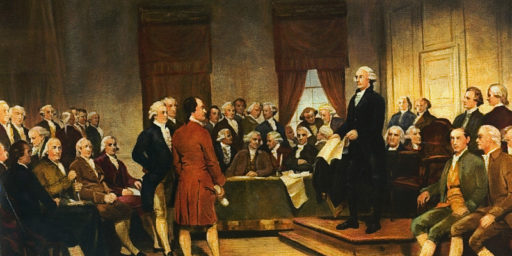John Thune: Lobbyist Turned Senator
Sheryl Gay Stolberg builds a piece in the NYT around the fact that South Dakota Senator John Thune was formerly a lobbyist.
It might be said that Senator John Thune went through the revolving door — backward.
As a lobbyist in 2003 and 2004, Mr. Thune earned $220,000 from the Dakota, Minnesota & Eastern Railroad, a small but ambitious company in South Dakota. The railroad hopes to rebuild and rehabilitate 1,300 miles of track, the nation’s largest proposed railroad expansion in more than a century. Now, as a junior senator from South Dakota, Mr. Thune is working to make that happen, raising questions about whether there should be curbs on lobbyists-turned-lawmakers in the same way that there are on those who take the more traditional route of leaving Capitol Hill for K Street.
[…]
There are no legal restrictions on the legislative activities of former lobbyists who get elected to Congress. But in the wake of the Jack Abramoff lobbying scandal and the subsequent focus on ethics, Mr. Thune’s experience has put a spotlight on what some experts call “the reverse revolving door.”
The issue is among those likely to be debated on Tuesday, when the Senate Committee on Rules and Administration meets to draft changes to the lobbying law. Senator Mark Dayton, Democrat of Minnesota and a member of the rules committee, is furious with Mr. Thune over the rail project, and intends to propose language imposing a two-year ban on lawmakers’ getting “personally and substantially” involved in matters affecting former clients. “This makes some of the Jack Abramoff deals look like penny ante,” said Mr. Dayton, who has a prominent constituent, the Mayo Clinic in Rochester, Minn., that is fighting the rail expansion. “It’s the most despicable special-interest deal I’ve ever seen in all my 30 years in government.”
[…]
James Thurber, an expert in money and politics at American University in Washington who has testified before the rules panel, said candidates should not lobby for a year before Election Day. “If they’re going to be running for the Senate or the House they should not be lobbying right up to the election,” Professor Thurber said, adding: “The conflict of interest is too serious. In a representative democracy, you have to be very careful about cutting off the linkages to specialized interests while you’re in office, as well as just before you get in office and after you leave.”
According to public records and a list compiled by Professor Thurber, at least eight current members of Congress worked as lobbyists before being elected. Some, like Mr. Thune and Representative Dan Lungren, Republican of California, became lobbyists during a hiatus in public service.
But, unlike sitting congressmen who take money from lobbyists, lobbyists who are running for public office are in the intense spotlight of public scrutiny. Presumably, the voters knew how Thune, Lungren, and others made a living and decided that they were nonetheless trustworthy.
Further, it is no more surprising that a Member who comes from a state that depends on railroading would seek to legislate in ways favorable to railroading than that a Member who comes from a state that depends on gambling would seek to legislate in ways favorable to his state’s gambling interests.
The bottom line is that people have to make a living and there is nothing inherently dishonorable about lobbying Members for favorable legislation or for Members to meet with lobbyists and seek campaign contributions from them. As with the three decade long campaign finance reform debacle, trying to legislate morality by trying to stop behavior that could conceivably create a conflict of interest, there will always be loopholes in any new rules.
The way to solve this problem–to the extent that it actually is a problem–is with sunshine. Members should be required to disclose all contributions from all sources immediately. Members should be required to disclosure their financial dealings, including business relationships within some reasonable period of time, immediately. Beyond that, it is up to the media, the opposition candidate, and the voters to ask questions.
And then there’s this from John Thune: “If you start banning elected officials from using their working knowledge on behalf of constituents, I think it would greatly erode our representative form of government.”



